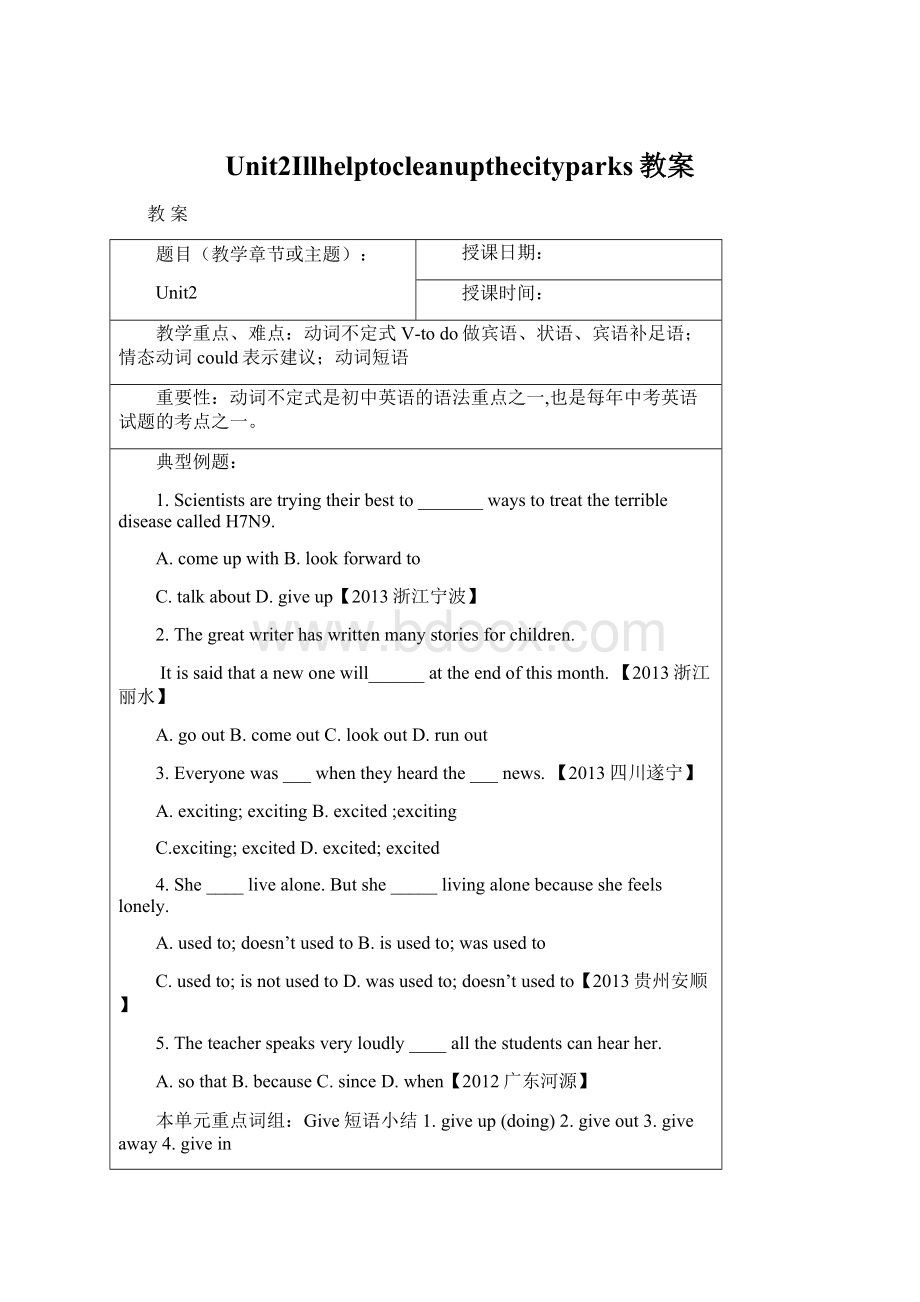Unit2Illhelptocleanupthecityparks教案Word文档下载推荐.docx
《Unit2Illhelptocleanupthecityparks教案Word文档下载推荐.docx》由会员分享,可在线阅读,更多相关《Unit2Illhelptocleanupthecityparks教案Word文档下载推荐.docx(13页珍藏版)》请在冰豆网上搜索。

1.Scientistsaretryingtheirbestto_______waystotreattheterriblediseasecalledH7N9.
A.comeupwithB.lookforwardto
C.talkaboutD.giveup【2013浙江宁波】
2.Thegreatwriterhaswrittenmanystoriesforchildren.
Itissaidthatanewonewill______attheendofthismonth.【2013浙江丽水】
A.gooutB.comeoutC.lookoutD.runout
3.Everyonewas___whentheyheardthe___news.【2013四川遂宁】
A.exciting;
excitingB.excited;
exciting
C.exciting;
excitedD.excited;
excited
4.She____livealone.Butshe_____livingalonebecauseshefeelslonely.
A.usedto;
doesn’tusedtoB.isusedto;
wasusedto
C.usedto;
isnotusedtoD.wasusedto;
doesn’tusedto【2013贵州安顺】
5.Theteacherspeaksveryloudly____allthestudentscanhearher.
A.sothatB.becauseC.sinceD.when【2012广东河源】
本单元重点词组:
Give短语小结1.giveup(doing)2.giveout3.giveaway4.givein
Up短语小结1.giveup2.cleanup3.cheerup4.fixup5.setup6.putup7.getup
8.stayup(late)9.comeupwith10.takeup(doingsth.)
Out短语小结1.giveout2.handout3.tryout4.goout5.eatout6.hangout7.findout
8.getoutof9.comeout
本次教学评价:
非常满意○较满意○一般○家长或学生签字共小时
本节课回访记录:
任课老师签字:
主任签字:
日期:
讲义
学生:
李新隆任课教师:
李莉
教学过程:
Unit2I'
llhelptocleanupthecityparks
1.I’dliketohelphomelesspeople.我想帮助无家可归的人。
homeless是形容词,意为“无家可归的”,由home+后缀-less构成。
【特别提示】:
less后缀通常加在名词的后面,构成形容词,表示与原来名词意思相反的形容词。
如:
groundless无根据的,odorless无气味的,careless粗心的,useless无用的。
2.Youcouldhelpcleanupthecityparks.你可以帮着打扫城市公园。
①动词help后可以接动词不定式作宾语或宾语补足语,这时不定式
helpv→helpful
helponeself(to)自用(食物等)。
helpsb.out帮助某人克服困难,渡过难关、解决问题、完成工作。
withthehelpof在……帮助下。
helpsb.withsth.帮助某人做某事。
②cleanup是“清除、除去(垃圾、污物)”等,使地方干净。
Pleasecleanuptheroomaftertheparty.聚会后把房间打扫干净。
Weshouldcleanupthedirtypartsofthesea.
我们应该清除海里的污染部分。
③cleanup还可以表示“挣得,赢得(多少钱)”。
Hecleanedupasmallfortune.他发了一笔小财。
特别提示:
cleanoneselfup意为“洗干净”。
Yourhandsaredirty,you’dbettercleanyourselfup.
你的手脏了,你应该洗洗它们。
练习:
Thewoman___allofhermoneytocharities____thepoor.
A.gaveoff,tohelpB.gaveup,helping
C.gaveaway,tohelpD.gave,helping
3.Youcouldgiveoutfoodatafoodbank.你可以在食品供应站分发食品。
①giveout在这里是“分发”,“散发”的意思。
OurEnglishteachergaveouttheexaminationpaperswhenthebellrang.
我们的英语老师在铃响的时候分发试卷。
②另外一个意思为“用完”,“消耗尽”。
Afteraweektheirfoodsuppliesgaveout.一周之后,他们的食物供应用完了。
③还有一个意思为“发出”,“送出”。
Thesungivesoutalotofheat.太阳能发出热量。
4.Helookssad.Let’scheerhimup.他看上去很伤心。
我们去帮他振作起来吧。
cheerupsb或cheersbup意为“(使某人)高兴起来,振作起来”。
如果是代词做宾语,则将代词放在中间。
例如:
Cheerup!
Thenewsisn’ttoobad.不要发愁啦,这消息不错嘛!
Hetookhertotheballettocheerherup.他为了使她高兴起来,便带她去看芭蕾舞。
Helookssad.Let’s___him___.
A.cheer,upB.put,upC.setupD.call,up
5.NotonlydoIfeelgoodabouthelpingotherpeople,butIgettospendtimedoingwhatIlovetodo.我不仅对帮助别人感到很满足,而且我还渐渐地花时间做自己喜欢做的事情。
(1)notonly...butalso(also可省略)是“不但……而且……”的意思,当置于句首时,notonly后面从句的主谓要倒装,但but(also)后面的主谓不用倒装。
e.g.:
NotonlyhashebeentoCanada,but(also)heknowssomeCanadians.
他不仅去过加拿大,而且还认识许多加拿大人。
Notonlydidheteachatschool,but(also)hewrotenovels.
他不仅在学校里教书,而且还写小说。
6.Thisvolunteerworktakeseachofthemseveralhoursaweek,soitisamajorcommitment.这份义工每周花了他们每个人好几个小时的时间,所以这是一个重大的贡献。
eachofthem是指“他们中的每一个”。
如果做主语,则谓语动词用第三人称单数形式。
【拓展】each与every的用法
①each指一个整体中的每一个,强调个体;
every着重于全体的总和,强调整体。
试比较:
Eachhasadifferentbook.(强调各有不同。
)
Hereeverychildattheageofsixcangotoschool.(侧重整体,无一例外。
②each可作形容词及代词,而every只能作形容词,但可与-one,-body,-thing等构成复合代词。
③each用在代词或复数名词前要用介词of连接,如eachofthem,eachoftheboys;
every不能直接跟of连接,
不可以说everyofthem,而要说everyoneofthem或eachofthem。
④every还可以表示“每隔”,后接基数词加名词,如everyfourweeks,everythreemonths等,此种结构中的every不能用each代替。
e.g.:
Shehadaresteveryfiveminutes.她每隔5分钟就休息一会儿。
7.“Don’tputitoff,”saysHuiPing.“Becomeavolunteertoday!
”
“别犹豫”,慧萍说,“今天就来当一名自愿者吧!
”
(1)①putoff意思是“推迟,拖延”。
例:
Neverputofftilltomorrowwhatmaybedonetoday.今日事今日毕。
Theyputoffthesoccergamebecauseoftherain.因为下雨,他们把球赛推迟了。
Youshouldnotputoffgoingtoseethedoctor.你不应该拖延去看医生。
②putoff还可意为“关掉”,相当于turnoff。
Pleaseputoffthelightsbeforeyouleavetheclassroom.在你离开教室前,请关掉灯。
(2)become是系动词,表示“变成,成为”,后面接名词、形容词、过去分词等。
Shebecamefamousinhercity.她在她所在城市的成为名人了。
【拓展】become可接介词of,构成whatbecomesofsb/sth表示“某人/某事进展如何”。
Whatbecameofthedreamsofouryouth?
我们年轻时的理想何在?
【注意】系动词get,turn,grow和become都可表示“变得,感到”,其区别是:
(a)get用于日常用语,后面常跟比较级。
Theweathergetscolder,andthedaysgetshorter.天气变冷了,白天变短了。
(b)turn指在颜色和性质等方面变得与原来不同。
Hisfaceturnedred.他的脸变红了。
(c)grow着重变化过程。
I